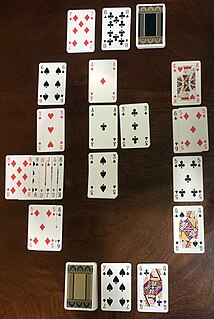
Calculation is a solitaire card game played with a standard pack of 52 cards. It is part of the Sir Tommy family of patience games. It has its origin in France, where it is known as La Plus Belle.

Pyramid is a patience or solitaire game where the object is to get all the cards from the pyramid to the foundation.

Russian Bank, Crapette or Tunj, historically also called Wrangle, is a card game for two players from the solitaire family. It is played with two decks of 52 standard playing cards. The U.S. Playing Card Company called it "probably the best game for two players ever invented".

Napoleon at St Helena is a patience or solitaire card game. It is quite difficult to win, and luck-of-the-draw is a significant factor. It is also popularly known as Forty Thieves.
Royal Cotillion is a solitaire card game which uses two decks of 52 playing cards each. The name probably derives from the fact that since the two kings and two queens of the same suit, the king and queen of each suit dance the cotillion. It has been given the alternate name of Lords and Ladies because if the game is won, the final layout will show the king and queen of each suit together.
British Square is a solitaire card game which uses two decks of 52 playing cards each. It is a fan-type game in the style of La Belle Lucie. It has an unusual feature of switchback building whereby each foundation is first built up and then built down.
St. Helena is a solitaire card game using two decks of playing cards mixed together. Despite its name, it has no connection to the island with the same name, nor should it be confused with a different solitaire game that has a similar name, i.e. the more well-known Napoleon at St. Helena, usually called Forty Thieves.
Fourteen Out is a Patience card game played with a deck of 52 playing cards. As this game involves carrying off cards with a fixed sum, it belongs to the same family of games as Pyramid. The name refers to the goal of each turn to make pairs that add up to 14.

Baroness is a solitaire card game that is played with a deck of 52 playing cards. Also known as Five Piles, it is a game that has an arrangement that is almost like that of Aces Up but with an even lower win rate and lower skill factor, combined with the game play of Pyramid.
Leoni's Own, also known as Weavers, is a solitaire card game which is played with two decks of playing cards shuffled together. This game may have come from Austria, takes approximately 20 minutes and is described as medium regarding difficulty and also uses an ingenious method called weaving,.
Deuces is a solitaire card game which is played with two decks of playing cards. It is so called because each foundation starts with a "deuce", or two card. It also belongs to a family of card games which includes Busy Aces, which is derived from Forty Thieves.
Imaginary Thirteen is a solitaire card game which is played with two decks of playing cards.. Its gameplay makes it a two-deck version of Calculation and its name is taken from the fact that when a sum is over thirteen, thirteen is subtracted to get the value of the next card, with spot cards worth their face value, jacks eleven, queens twelve, and kings thirteen.

Spider Solitaire, also known as Microsoft Spider Solitaire, is a solitaire card game that is included in Microsoft Windows. It is a version of Spider. As of 2005, it was the most played game on Windows PCs, surpassing the shorter and less challenging Klondike-based Windows Solitaire.
Jubilee is the name given to two solitaire card games, both played with two decks of playing cards. Both games are so-called because they were created during the time of the Golden Jubilee of Queen Victoria in 1887. One of the games has an ornate layout, while the other is simpler and it belongs to the family of games which include Sir Tommy, Strategy, and Calculation.
Archway is a solitaire card game using two decks of 52 playing cards. Its goal is to bring all 104 cards into the foundation. It was invented by David Parlett, and is based on an old French solitaire game called La Chatelaine.
Elevens is a solitaire card game using a standard 52-card deck, with the goal of removing pairs of cards that add to eleven. Odds of winning are slightly better than 1 in 10.
Aces and Kings is a challenging and original solitaire game using two decks of playing cards, and was created by Thomas Warfield. The object of the game is to build 8 foundations down from King to Ace or up from Ace to King without regard to suit.
Bowling Solitaire is a patience or solitaire card game that uses a single deck standard playing cards to simulate a round of ten-pin bowling.
Travellers is a card game of the patience genre which uses a single card pack of either 52 or 32 playing cards. It is also known as All Fours, Clock, Four of a Kind, Hidden Cards, Hunt, Sundial or Watch. Parlett notes that the game has a "rhythmical feature that might be called 'shuttling'", as in the game of Weavers.
Good Thirteen is a simple, German patience game for one person, played using a French pack of 52 playing cards. It also goes under the name Thirteens.








